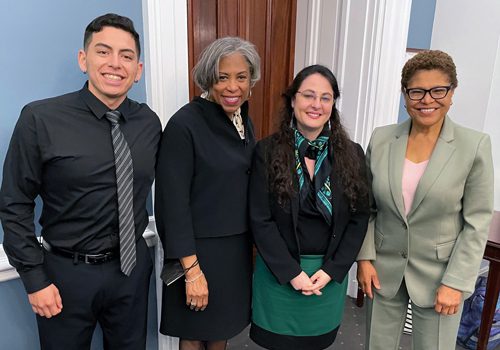Media Alert
Rep. Bass Hosts Dinner for Kinship Care Bill
Congresswoman Karen Bass and the National Foster Youth Institute hosted a dinner in the Capitol Tuesday evening, April 5, 2022, to draw attention to legislation she would introduce the following day that would provide support and assistance to individuals and families seeking kinship guardianship. During the reception CRISP Legislative Director Dr. Angelique Day, an associate professor at the University of Washington School of Social Work, presented from the research she provided to Rep. Bass’s office during the crafting of the bill. CRISP director Charles E. Lewis, Jr. also attended the semi-private event that included several members of the Congressional Caucus on Foster Youth, including Caucus co-chairs Reps. Don Bacon (R-NE-2), Jim Langevin (D-RI-2), and Brenda Lawrence (D-MI-14). Other Members of Congress attending were Reps. Judy Chu (D-CA-27), Danny Davis (D-IL-7), and Terri Sewell (D-AL-7).
Much like CRISP whose mission is to complement the work of the Congressional Social Work Caucus, the National Foster Youth Institute complements the work of the Congressional Caucus on Foster Youth co-founded by Congresswoman Bass upon arriving in Congress. The bipartisan Congressional Member Organization is dedicated to improving the child welfare system, with a particular interest in youth in foster care. National Policy and Organizing Director Zahra Marin was on hand to greet guests and introduce the speakers.
A highlight of the evening was testimony provided by Robert Romero who traveled from Los Angeles on his first flight ever. An aspiring musician and communications specialist who was raised and is living with his aunt and uncle, Robert recounted how he was rescued from the trauma of being displaced from his home and separated from his siblings. He spoke about the problems caused by having to get new

From left: Robert Romero, Rep. Brenda Lawrence, Dr. Angelique Day, and Rep. Karen Bass.
identification and having two identities. He credits kinship guardianship giving a stable environment and life and putting him on the path to a productive life. You can hear more of his life’s story on the recording of the congressional briefing.
Dr. Day followed with an overview of the research she provided for Congresswoman Bass’s office. Dr. Day serves on the Steering Committee of the National Technical Assistance Center on Kinship and Grandfamilies at the Department of Health and Human Service (HHS). She is the lead evaluator for five federally funded research projects at the Children’s Bureau. In addition to her extensive research in child welfare, Dr. was awarded a yearlong fellowship by the Society for Research on Child Development and the American Association for the Advancement in Society that placed her in the office of Rep. Danny Davis where she helped oversee his child welfare and higher education legislative portfolios.
The bill H.R.7416, tentatively titled Promoting Permanency Through Kinship Families Act, has four original co-sponsors: Reps. Sheila Cherifilus-McCormick (D-FL-20), Jahana Hayes (D-CT-5), Brenda Lawrence (D-MI-14), and Mary Gay Scanlon (D-PA-5) and has been referred to the House Committee on Ways and Means. The bill is designed to amend parts B and E of title IV of the Social Security Act to remove barriers and encourage kinship guardianship, foster, or adoptive placements for children who cannot be safely cared for in their own homes, and for other purposes. The bill supports the premise foster care children have better outcomes when cared for by relatives. Among its provisions, the bill would:
- Promote kinship placements by requiring state plans for child welfare services to provide for the diligent recruitment of relatives and fictive kin, to provide for locating and involving relatives and fictive kin as a regular and ongoing part of case planning, and to address barriers to family involvement,
- Require state plans for foster care and adoption assistance to require and document prompt, active, and continuous efforts to identify and locate relatives or fictive kin as potential kinship guardianship, foster, adoptive placements, and family support resources, and
- For children residing in a kinship placement, require states to make reasonable efforts to maintain such children in their kinship home except to effectuate permanency goals of reunification or upon a showing by clear and convincing evidence that remaining in the kinship placement is contrary to the welfare of the child.
